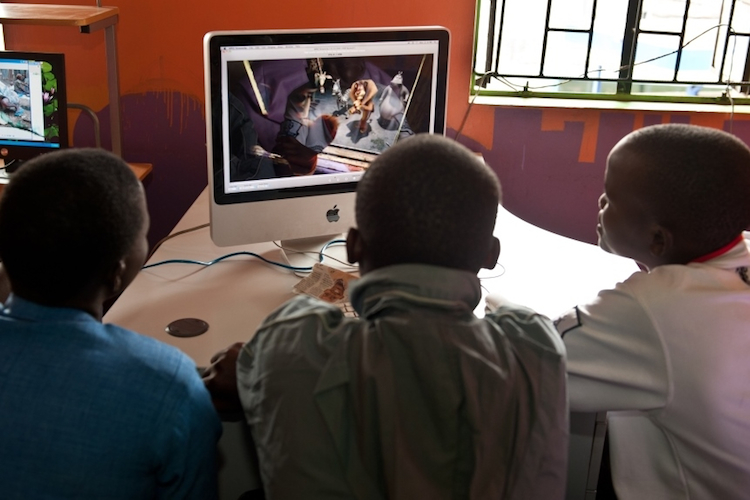“In boarding school there were a group of girls who were from Nairobi and they were hip and cool, they were computer literate … They would open email accounts for us and show us how to go about the internet and so on, that is how I learnt how to use the internet … log into Facebook and even text our boyfriends back home.” – Female, 15-17, Kitui, Kenya
I remember the first time I heard about Facebook – it was early in 2007 while I was attending university. My sister was on an exchange abroad and encouraged me to join. By the end of that same year I had connected with all my university friends and even some old friends from school.
Fast forward six years, and the first memories of using the world’s most popular social media site come back to me when I was presented with the findings of A (Private) Public Space, a study about the use of the Internet and social media among adolescents in Kenya. Based primarily on focus group discussions conducted in three locations in the country, one of our main motivations for undertaking this particular study was to understand the how and why of what Kenyan children and youth are doing online.

The title of the study comes from a sentiment expressed by the majority of participants – that social media and their mobile phones give them the opportunity to construct their own private worlds, to explore their identities free from the interference of family members, to strengthen existing social connections and to establish new ones.
“On the internet you are more confident than face to face. There are some things you can say there that you fear saying face to face.” – Male, 15-17, Kisii
While the findings are not nationally representative – a limitation of the methodology – the study provides a fascinating look into the habits and uses of the Internet and social media by young people in the country. While less than one-third of Kenyans have access to the Internet, the proliferation of affordable Internet-enabled mobile phones and flexible pre-paid schemes is helping to shift this rapidly. Kenya also has one the largest Facebook and Twitter user bases on the continent and the popularity of social media was clearly expressed by the study participants.
It is also not uncommon to hear of Kenya being referred to as the Silicon Valley of Africa, yet in spite of the country’s status as an ICT innovation hub, the study found that overall digital media was not fully integrated into the participants’ learning environments and education. While some shared examples of using the Internet and their mobile phones to research topics for school, many felt that their parents and caregivers mostly saw the Internet as a distraction from schoolwork and learning.
Risks of online use
In addition to looking at habits and uses, the study also sought to understand how risks associated with online use – including cyber-bullying, suggestive self-exposure, exposure to harmful content, scams, and grooming for sexual exploitation – were perceived by young people, to give us insight that can inform future interventions and awareness-raising campaigns on child online safety.
“This guy I befriended on Facebook, he started telling me to send him photos of myself without clothes on, I told him I can’t, he insisted and I refused, he then started [verbally] abusing me and I called him a few names too, he could not stop and I shared with my older cousin who blocked him for me.” – Female, 15-17, Nairobi South B
The discussions on topics related to online safety revealed that many of the participants appeared to have only an abstract awareness of risk. Many were aware but ultimately did not believe that a dangerous encounter could befall them, or they felt they were employing the right preventative measures, or that being connected ultimately outweighed the risk of online harassment or unpleasant experiences. Knowledge of or interest in changing privacy settings was low, although most reported knowing how to block unwanted interactions.

For me the clear take-away from the discussions on risk and safety with Kenyan teens is that in order to be successful, any awareness-raising and educational efforts need to take into account all these complexities.
Approaches based on fear-mongering or preaching are unlikely to be effective. This is not to suggest that children and youth should not be taught about the potential risks of immersion in the digital world. However outreach messaging should balance issues of safety with the developmental and learning opportunities afforded by the Internet, and promote positive online interaction through the concept of digital citizenship.
There is a real opportunity here to empower peer support groups and youth organisations to take the lead on this, while at the same time working with parents, teachers and child protection services to strengthen their ability to provide support, and working with policy makers to improve relevant policies and legal environments. By doing this, we can start to create environments where opportunities are maximised and risk is minimised – and children and youth in middle-income and developing countries have the right base from which to emerge as leaders in the global information and communication technology sector.
You can download the full report here.
Kate Pawelczyk is the project manager of Voices of Youth Citizens – a UNICEF initiative that seeks to understand how young people in middle-income and developing countries are using digital media to inform awareness-raising, interventions and policy advocacy. Kate is South African and currently based in New York City. Any questions about the study in Kenya or the Voices of Youth Citizens initiative can be directed to her via email.

Comments are closed.